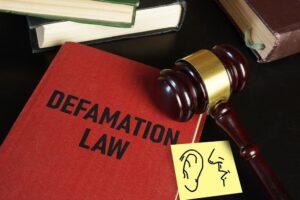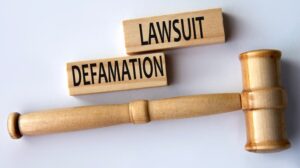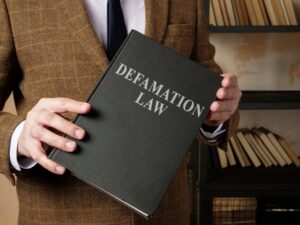Public Figures and Defamation
If you are a public figure, you are used to rough discourse, some of it aimed your way. There may be people who are interested in opposing you, whether in the business or political realm. Some people may profit from spreading false information about you because it gets them clicks and attention. The law limits what people can say about you, even when you put yourself into the public realm.
If you believe someone defamed you, you can sue them. As a public figure, you have a higher standard that you must meet to win your case because the law also has an interest in protecting people’s rights to free speech, and by entering the public sphere, the public gains the right to know about you. Nevertheless, in numerous instances plaintiffs have won high-profile defamation cases resulting in large damages.
First, contact a defamation attorney to learn whether you may have a potential lawsuit. You should prepare to go through a difficult and public trial, but you may need to do so to get justice and clear your name. If you win, you can recover substantial financial compensation for the damage to your name and reputation.
How to Prove Defamation

Generally, to win a defamation case, you will need to prove:
- Someone made a false statement that purports to be a fact
- The statement was publicized or made to a third person
- There was at least negligence involved in making the false statement
- You suffered damages or harm to your reputation
In the past, a uniform standard applied to all types of defamatory statements, whether they were made about public or private figures. When it comes to a public figure, the state of mind of the person who made the statement can apply to the case.
Legal Standards for Defamation Involving Public Figures
Public figures who have filed a defamation lawsuit have a higher standard of proof that they must meet to win their case. There are concerns about free speech when someone is speaking about a public figure.
Courts have tried to balance the policy interests of First Amendment rights with a public figure’s right to freedom from defamatory statements. Private figures have an easier path to winning a defamation case because they choose to remain out of the spotlight. If a public figure files a defamation lawsuit, they must prove much more to be in a position to receive compensation.
There is an interest in having a robust debate about public issues. However, in public dialogue, people do not always get the facts right and can make wrong statements.
The United States Supreme Court addressed the issue in Sullivan v. New York Times. In this case, the New York Times published an advertisement criticizing police in Montgomery, Alabama, for how they treated civil rights protestors. Several statements in the advertisement presented an inaccurate portrait of the facts.
The police commissioner sued the newspaper in Alabama state court and won a judgment against the New York Times. The case went all the way to the Supreme Court on appeal.
The court established a standard for public figures, such as a police commissioner. Here, the court established the standard of actual malice in defamation lawsuits filed by public figures. A defendant must have made a false statement with knowledge that the facts were wrong or with a reckless disregard for the truth. This is a much higher standard than what applies to private figures, who must only show that the statement was made with negligence.
In other words, the public figure needs to prove more than just that the defamatory statement was false. They need to show that the statement was made with either intent or recklessness.
Types of Public Figures
You may be a public figure and not even know it. On the other hand, you may not be a public figure when you think you are, or you may not fully be a public figure for purposes of the law.
According to the United States Supreme Court, a public figure has assumed roles of special prominence in the affairs of a society or thrust themselves into the forefront of particular public controversies to influence the resolution of the issues involved. You can also become a public figure if you have achieved pervasive fame or notoriety.
However, different standards apply based on the type of public figure you are. You may have been previously unknown, and you have placed yourself amid a public debate. In that case, you may not be a full-fledged public figure. Instead, you may be a limited-purpose public figure.
Here, you would need to prove that the defamatory statement applied only to the matters in which you are a public figure. Limited-purpose public figures have more protection under the law than full-fledged public figures.
Examples of High-Profile Defamation Cases

Defamation cases often captivate the public when a famous person is involved. Often, a sensational allegation or fact statement is made, and a plaintiff wants to clear their name and gain a measure of accountability for the person who has defamed them.
In some cases, plaintiffs have won verdicts so large that it has forced the defendant to go out of business (if they are a company) or to sell their assets to pay for the judgment. If you are a defamed public figure, that should not matter to you.
Over the years, some of the more high-visibility defamation cases have included:
- Actor Johnny Depp won a $10 million judgment against fellow actor and ex-wife Amber Heard in a sensational trial after she made claims in an interview that can reasonably lead people to believe that he engaged in domestic violence against her when they were married.
- Dominion Voting Systems, a maker of voting machine technology, reached a large settlement in its lawsuit against Fox News, after the network claimed that its technology was rigged to work against one side in the election. Evidence learned in the discovery process showed that the network’s anchors knew the claims were false when they reported them on air.
- Parents of Sandy Hook Elementary shooting verdicts won a verdict of nearly $1 billion against online personality Alex Jones. In addition, Jones was ordered to pay $473 million in punitive damages. He had made false statements online that included allegations that the shooting victims and their parents were paid actors. Currently, Jones is being forced to liquidate much of his property to compensate the plaintiffs in the case.
- Actress Cameron Diaz settled a lawsuit against the National Enquirer out of court when the tabloid claimed that she was having an affair with an MTV producer.
As you can see, defamatory statements can span a wide range of false utterances. They can be about your personal life or business practices. The common element is that you can receive a large amount of money or settle a case for a substantial amount when there is evidence to back your case. Even if you have to go through a highly public court case, you may need to do this to get justice.
Damages in a Defamation Lawsuit

If one wins a defamation lawsuit, they may be entitled to substantial financial compensation. You can receive money for all the harm that you have suffered. There have been some cases where public figures have won a declaration that a statement was defamatory, but a jury has awarded them nominal damages.
In some cases, you may wish to clear your name, but you must also prove that you suffered damages for the jury to award you money.
Damages in a public figure defamation lawsuit may include:
- Special damages that represent the actual economic losses you suffered from the defamatory statements, whether it is a loss in your earnings capacity or a reduction in your business profits.
- General damages are the equivalent of non-economic damages in a personal injury case. For example, you could have suffered mental health issues or emotional distress as a result of what was said about you. Some defamation cases may not allow for these types of damages.
There are some cases in which a jury may award you a very large sum of money based on both your actual damages and the level of fault that the defendant has. Since the facts of public figure defamation cases can often be outlandish, a jury may decide to award you punitive damages to make an example out of the defendant.
In numerous recent defamation cases, juries have hit defendants with extremely large verdicts. The punitive damages often far outweigh the actual damages awarded by a jury because sending a message is as important to the jury as compensating you for the harm that you suffered.
A defamation lawyer would certainly make the argument about why you deserve punitive damages for what was said about you. The more outlandish and malicious the statement, the greater the chance you may be eligible for punitive damages.
Why You Need a Defamation Attorney for Your Case

There are numerous complexities involved in any defamation lawsuit. First, the actual standard that applies to your case may be uncertain. While the defendant may be arguing that you are a public figure, you may not even be a part of that category, and you may have a lower standard of proof that you must meet.
If you are a public figure, you can expect a lengthy and uphill battle, but you have a chance of winning if the facts and law are on your side.
A public figure defamation case will involve complex constitutional issues that you should be aware of to make the right arguments to the jury. The defendant will certainly argue that the First Amendment protects their speech. Even if their speech is not protected, they will then claim that they did not know it was untrue when they uttered it. Either way, you must overcome a litany of defenses before successfully proving your case to a jury.
The lawsuit process itself is critical to your defamation case. You will begin your lawsuit with the premise that the statement made against you was false and that you suffered injuries from it. However, the missing element of your case is what the defendant knew, or should have known at the time that they made the statement.
You will need to gather evidence that will prove their state of mind at the time they made the statement. Your defamation lawyer can do that through the discovery process, when they can take depositions from the defendant and witnesses who were familiar with their frame of mind.
Your defamation attorney can also obtain documentary evidence from the defendant to show whether the defendant acted with actual malice necessary to make them liable for their actions.
Call An Experienced Defamation Attorney Today to Protect your Rights
Contact a defamation lawyer early in the process because they can work promptly to build a stronger case. They may take steps to actively put a stop to statements that are being made and help you learn whether you can sue. Defamation can have lasting impacts on your personal and professional life, and the consequences can be significant.
That’s why it’s important to have a skilled attorney by your side at The Lopez Law Group, advocating for your rights and fighting for the justice you deserve. Just remember, cases involving public figures may be more challenging because of the legal standard involved.
